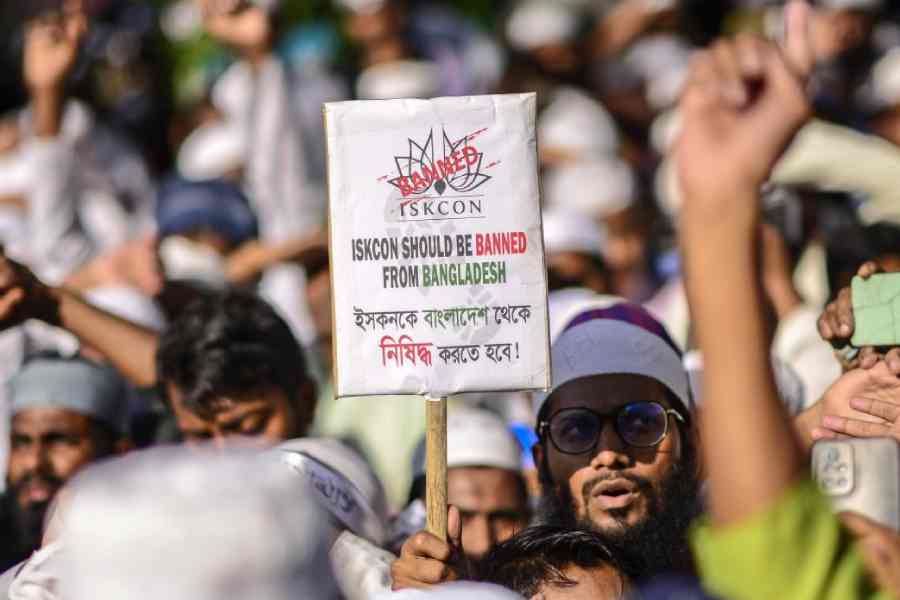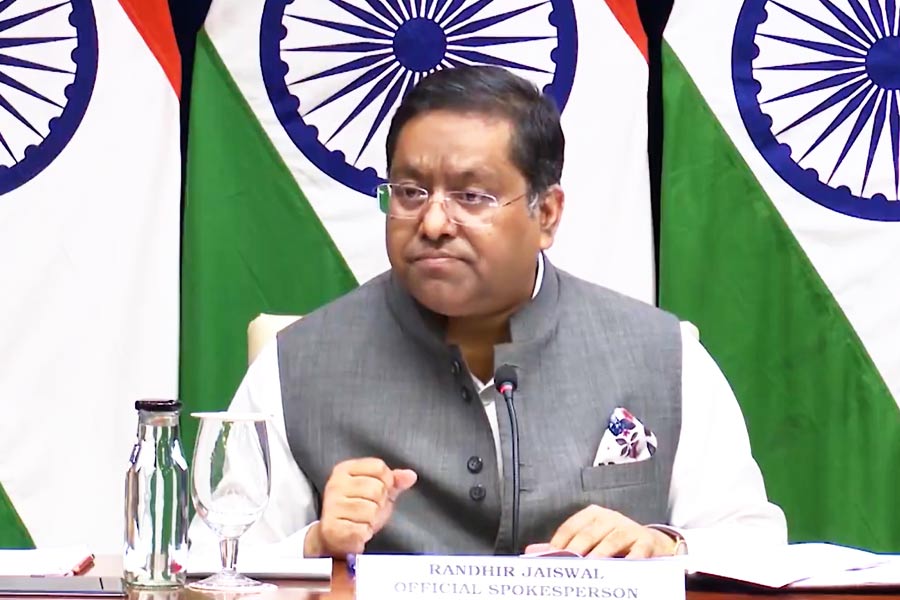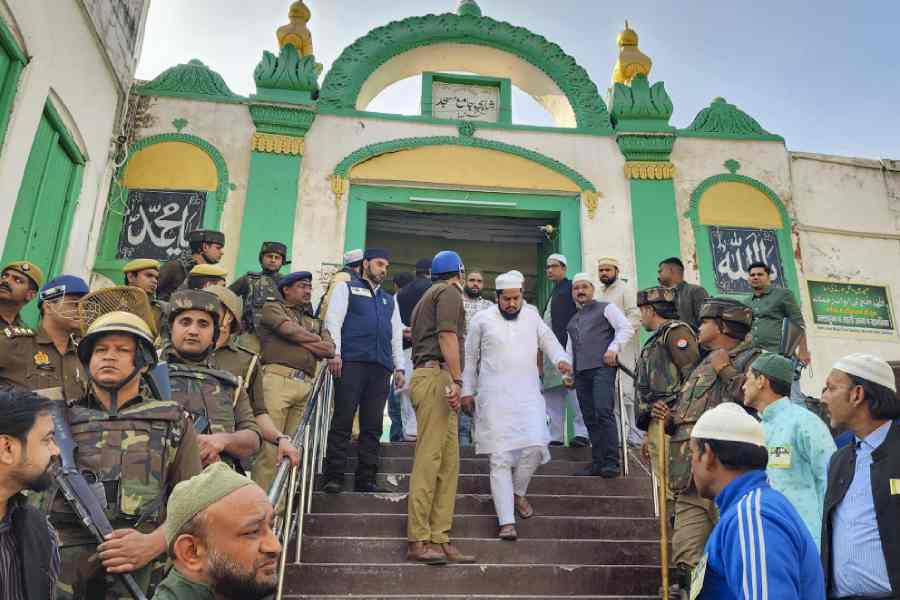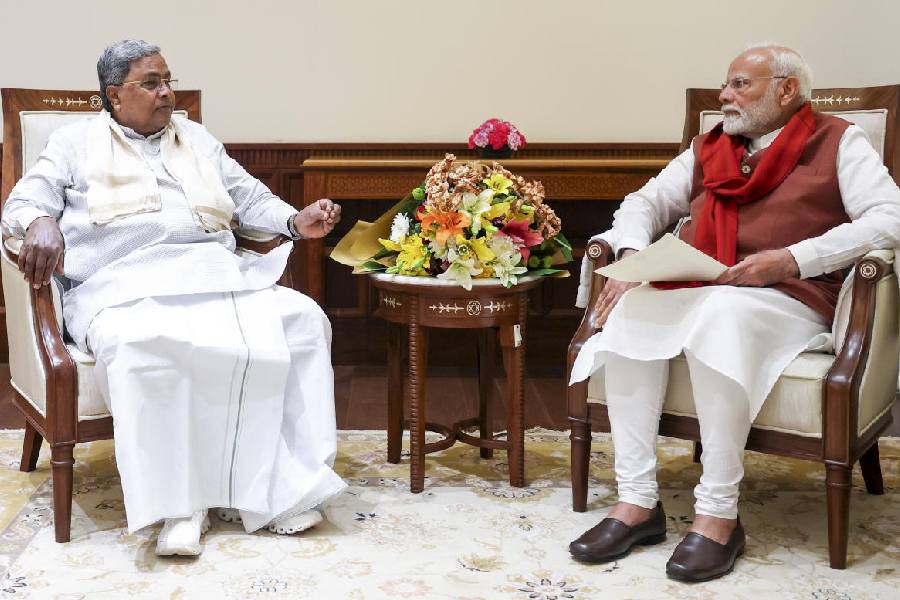New Delhi-Dhaka exchanges scaled higher decibels on Friday with India reiterating its concerns at the surge of “extremist rhetoric, increasing violence and provocation” against minorities in Bangladesh, and a key member of the Muhammad Yunus government terming the comments “condemnable and objectionable”.
Ministry of external affairs spokesperson Randhir Jaiswal’s comments on the situation across the border came amid reports of continued attacks on Hindus and growing demands from the Hefazat-e-Islam and Hizb-ut Tahrir for a ban on Iskcon for its “terror activities”.
“We are concerned at the surge of extremist rhetoric, increasing incidents of violence and provocation.... Iskcon is a globally well-regarded organisation with a strong record of social service. We once again call upon Bangladesh to take all steps for the protection of minorities,” Jaiswal said at the ministry’s weekly briefing.
He said these developments cannot be dismissed merely as (foreign) media exaggeration, which has largely been the narrative in the Bangladesh media that has been acting virtually as a mouthpiece for the Yunus regime.
On the arrest of former Iskcon monk and Hindu leader Chinmoy Krishna Das, India expressed hope that the legal process would be “just, fair and transparent”. Das’s supporters are accused of killing a lawyer while protesting a lower court’s decision to deny bail to the monk.
Das, whose release has been one of the Indian establishment’s key demands, spent a fifth day in prison on Friday.
In the absence of clarity on when the court might take up his bail plea again, Iskcon and several other organisations have expressed concern about his safety in prison.
Earlier in the day in India’s Parliament, the Narendra Modi government tabled a written reply on Bangladesh.
It said the government had taken serious note of the “incidents of violence against Hindus and other minorities, their homes and business establishments and of attacks on temples/ religious places” and shared its concern with the (Bangladesh) government.
That the Indian government’s expressions of concern — backed by the Opposition parties — have not cut much ice with the Yunus regime was evident from a Facebook post by Asif Nazrul, legal adviser to the interim government.
“India is expressing undue concern over Bangladesh’s situation. Indian Muslims are facing numerous atrocities but the neighbouring country has no qualms or remorse about it. This hypocrisy of India is condemnable and objectionable,” Islam wrote.
The Bangladesh ministry of foreign affairs too released a statement criticising Thursday’s “violent protests” outside the country’s deputy high commission in Calcutta, during which it claimed the demonstrators set fire to Bangladesh’s national flag and burnt Yunus’s effigy.
Such reactions from official circles in Bangladesh will not be “productive”, said former foreign secretary Harsh Vardhan Shringla, who had served as the Indian high commissioner in Dhaka.
“Instead of addressing the concerns raised by India, what we are seeing is a bout of counter allegations, which is not going to be productive,” he told The Telegraph.
The Bangladesh authorities’ indifference to India’s concerns was apparent also in their 30-day freeze order on the bank accounts of 17 people associated with Iskcon, including its former member Das.
Several Bangladeshi media outlets have reported that the Bangladesh Financial Intelligence Unit, which works under the country’s central bank, had sent directives to banks and financial institutions suspending all transactions related to these 17 accounts.
A source in Chittagong said that two Das aides — Shyamdas Prabhu and Ranganath Das — had been arrested without a warrant when they visited the prison carrying food for the monk, a vegetarian.
“This is an example of the institutional ostracism of minorities in today’s Bangladesh.... Anyone can be arrested,” the source said.
The minorities’ fears about a government crackdown have deepened with Islamist parties holding rallies across Bangladesh after the Friday prayers, seeking a ban on Iskcon and demanding exemplary punishment for those behind the killing of Saiful Islam Alif.
The young lawyer had died on Tuesday during a clash on the CMM court premises in Chittagong. Islamist groups are blaming Das’s supporters who had gathered there, demanding his release.
On October 30, a sedition case had been filed against 19 people, including Das, in Chittagong accusing them of disrespecting the country’s national flag during a rally by Hindus. The monk was arrested on Monday.
Barrister Tania Amir, one of the most influential voices in Bangladesh’s legal fraternity, questioned the rationale behind Das’s arrest on sedition and treason charges.
“The alleged incident took place in the public domain and videos are available. There was no need for an arrest in this case,” she said, before arguing that the “ingredients of treason and sedition” were absent from the case filed against Das and others.
She went on to drill holes into the demands for a ban on Iskcon.
“Those calling for a ban are banned organisations like the Hizb-ut Tahrir.... Members of these organisations, carrying ISIS flags, are openly trying to overthrow the Constitution,” she said.
“Their acts have all the ingredients of treason, but the government is turning a blind eye and allowing them to carry on with these illicit activities.”











